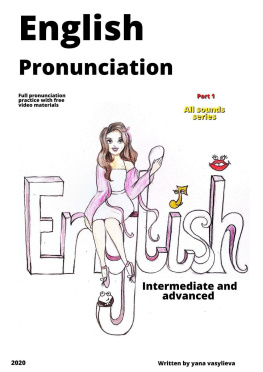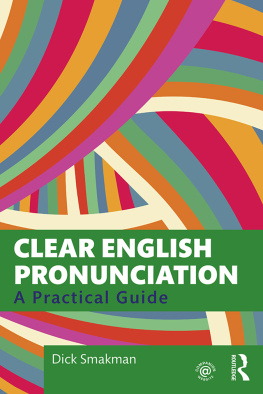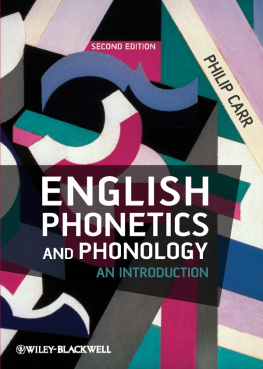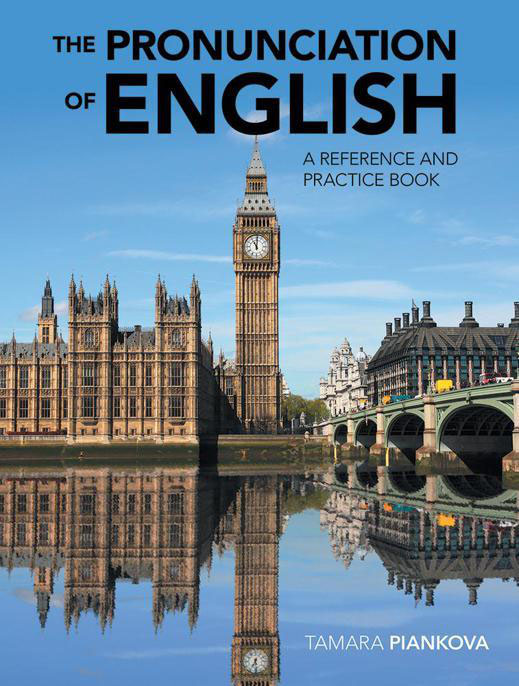THE PRONUNCIATION
OF ENGLISH
A REFERENCE AND PRACTICE BOOK
DR TAMARA M. PIANKOVA
Copyright 2014 Tamara Piankova.
All rights reserved. No part of this book may be reproduced, stored, or transmitted by any meanswhether auditory, graphic, mechanical, or electronicwithout written permission of both publisher and author, except in the case of brief excerpts used in critical articles and reviews. Unauthorized reproduction of any part of this work is illegal and is punishable by law.
ISBN: 978-1-4834-1400-3 (sc)
ISBN: 978-1-4834-1399-0 (e)
Lulu Publishing Services rev. date: 08/18/2014
CONTENTS
Preface
ENGLISH SOUNDS
Specific Features of English Sounding
Consonant Sounds
/p/
/b/
/t/
/d/
/k/
/g/
/f/
/v/
//
//
/s/
/z/
//
//
/h/
/t/
/d/
/m/
/n/
//
/l/
/r/
/w/
/j/
Vowel Sounds
/i:/
//
/e/
//
/a:/
//
/o:/
/u/
/u:/
//
/:/
//
/e/
/a/
//
/ou/
/au/
//
/u/
/a/
/au/
WORD STRESS
Importance of Word Stress in English
Placement of Word Stress
PHRASE AND SENTENCE STRESS
Typical Cases of Phrase Stress
Words Normally Unstressed in Utterance
Special Cases of Phrase Stress
Sentence Stress
RHYTHM
Stressed Syllables
Unstressed Vowels
Strong and Weak Forms
Tone Groups
INTONATION
Intonation and its Functions in English Speech
The Rise-Fall
The Rise
Direct Speech
READING PRACTICE
GLOSSARY OF TERMS
Once learners are aware that English words have a stress pattern,
that words can be pronounced in slightly different ways,
that the pitch of the voice can be used to convey meaning,
then they will know what to pay attention to
and can build upon this basic awareness.
Joanne Kenworthy
Exercise is the chief source of improvement in all our faculties.
Hugh Blair
List of English Phonetic Symbols, Abbreviations, and Signs
Consonant Sounds
Sounds
Sounds
Sounds
Sounds
Sounds
Sounds
Sounds
Sounds
Sounds
Sounds
Sounds
Sounds
Vowel Sounds
Sounds
Sounds
Sounds
Sounds
Sounds
Sounds
Sounds
Sounds
Sounds
Sounds
Sounds
Abbreviations
adj. adjective
for example
and other things of the same sort
that is
inf. infinitive
noun
something
verb
viz. namely
Signs
Signs Signs Signs
Signs Signs Signs Signs Signs Signs
Signs Signs
Signs Signs Signs Signs
Signs Signs Signs Signs
Signs Signs Signs Signs
Signs Signs Signs Signs Signs Signs
Signs Signs Signs
Signs Signs Signs
Preface
There are two elements in speech what we say and how we say What we say makes use of consonant and vowel sounds to form words, phrases, and sentences. How we say it relies on stress in a particular syllable or word, on rhythm, and on intonation (tone of voice). Both elements are important for the listener to understand and for the speaker to be understood.
When a foreigner does not pronounce English sounds clearly, a native speaker can hardly understand a word. At the same time, listening to a native speaker, a foreigner may happen not to recognize a spoken word because they used to pronounce it in a different way, and what they hear at the moment does not correspond to the acoustic form stored in their minds.
The stress pattern of a word is an important feature of the words spoken identity. Thus we find not (which may be heard as electro'city). Foreigners who unwittingly alter word stress can have great difficulty in making themselves understood. For instance, if the word house-warming is stressed on the second syllable, the listener may understand it as making the house warmer. Stress pattern may even partly convey contrasts of meaning, as with and
To emphasize particular words in a sentence, which the speaker thinks to be the most important in the utterance, they use a sentence If the speaker does not use it or the listener fails to grasp it, the listener may miss the point the speaker is leading them to.
English has a characteristic rhythm which is greatly governed by:
Pronunciation of stressed syllables
Reduction of unstressed vowels
Strong and weak forms of words
Uninterrupted stream of sounds and words within tone groups
Speed of speech.
The choice of the wrong intonation pattern may cause misunderstanding, just as the wrong sound does. For instance, the regular use of a narrow range between the upper and the lower limits of a speakers voice may give an impression that the speaker is rude, arrogant, and has bad manners.
Pronunciation is assisted by syllabic division of words, which is based on true phonetic principles, i.e. on the spoken language. It has nothing to do with word division in writing or printing, where a word occurs at the end of the line and part of it must be carried over to the next line, as with The division regards only ease of utterance.
According to the phonetic principles, in spelt words, a stress mark is never placed:
Between double consonants representing a single sound
Between the letters of a spelling form of a single sound
Within consonant sound groups /sp, st, sk, spr, str, skr, spl, skw, kw, kr, gr, tr, pl/, which are generally pronounced together a'cquit,
On etymological grounds
It may be added that syllabic division by etymology can be done only by those who have studied the subject, whereas all speakers should know how a word is sounded. For example, we divide banquet phonetically into But if we followed the etymology, we should have to divide it into banqu-et (literally little bench derived from the French word banc bench).
In this book, the description of English consonants and vowels is based on the sound classification and on the symbols used by Prof. Daniel Jones, a great authority on English phonetics. Our practice exercises are developed specifically for training foreign learners of English. The pronunciation of words is that given in the Oxford Advanced Learners Dictionary.
Dr. Tamara M. Piankova
Specific Features of English Sounding
English Foreign learners of English run into several difficulties of pronunciation. First, it is necessary to learn to pronounce new sounds, which are absent from their mother tongue, without replacing them by other sounds. Learners do not always discern the subtle difference between the sound that they hear or produce and the same sound pronounced by a native speaker. They perceive sounds of a new language from the standpoint of their mother tongue. Therefore, it is very important to draw their attention to the similarities and differences in the articulation of similar English and native sounds.












